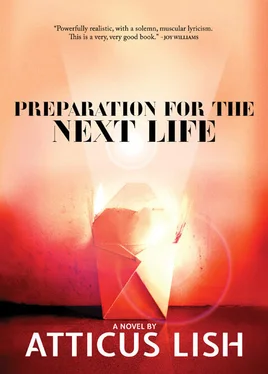How’s that ice cream, baby?
Good!
She licked the side of the cone. He watched her, his mouth a flat line. Slowly he slid his hand up her leg. He swallowed. He put his hand all the way up between her legs and squeezed.
How’s that.
He glanced at her.
She nodded, concentrating on her cone as if he wasn’t there. He swallowed again. She kept her eyes straight ahead. His arm was working under the table. Heat through her jeans. He pretended to eat his ice cream. A minute later, she sighed and shifted forward, hiding her face from the loud restaurant and from him. She flushed, as if in mortification, and opened her legs. He heard her breathing. Her jeans damp. He kept working, glancing sideways again. Then she tremored — it was distinct. She swayed and went weak and pressed against his arm.
Outside, he held her around the waist, saying to her:
It don’t matter where we go, we just gotta go somewhere. You feel that?
He pressed against her leg.
Yeah, I feel.
He was scanning around for a black car that might be a cab.
You bring the thing?
The what?
The… the biyuntao?
What, a rubber? Yeah, I got that. There’s one. Let me flag this fool down.
A Lincoln Town Car pulled up in front of them, aerial waving, and Skinner and Zou Lei got into the leather backseat, a wooden cross dangling from the rearview with the air freshener and reggaeton ratatatting from the speakers.
Dude, I want to go to a hotel near here, like not too far away. You got me? Like what hotels are there?
The driver, who they could barely see, said he would take them to Queens Boulevard.
And we can’t go to your place, right? Skinner asked Zou Lei.
No, they could not do that, because she had roommates.
Good to go, Queens Boulevard.
But right when the driver put his foot on the gas, Skinner had to tell him to wait. Just hold it, thirty seconds. He jumped out and Zou Lei watched him run back into the KFC. Then he came out carrying something, and it was the assault pack with the pistol in it, which he had left forgotten under the seat where they were sitting.
The first time he had taken his shirt off in front of her — this was in the motel they went to in Rego Park — she had seen his yellowish gray torso in the lamplight, which cast a warmer color on him, giving his skin a life it didn’t have on its own. She had not been paying attention. But then her hand had moved from his shoulder and touched his back. She withdrew and they stopped kissing for a moment. She gave him a little push to turn him so she could examine him in the lamplight. He said oh that.
She hadn’t known what it was, had not connected it to the war. She had thought it was a birth defect or a contagious disease.
You can’t like catch anything from it.
She said okay. She touched it. The tissue felt cold.
It hurts?
Not really.
She laid her palm on the dented puckered slick bumpy knotted flesh.
You get in the war?
He said yeah.
She made a tsking sound.
They shoot you in the body?
Shrapnel, he said, his back to her in the lamplight.
She examined him for a moment longer. Sighed. She moved her hand up above the damage and smoothed her palm across the death wings spread across his shoulders.
HE FOUND A ROOM on Craigslist that was in her area, one stop further out on the Long Island Railroad. From Chinatown, he took the bus up Franklin and got off at 160 thStreet. They were all small houses under the power lines, with sneakers tossed over them. The curbs were worn-down, creating the illusion of pooled water sheeted over the ground, as after a rain. Through the trees, you could see the train tracks and the graffiti on the rocks.
One of the houses had its postage-stamp yard filled with statues and figurines — of elves, wise men, the crucifixion, leprechauns, animals, plastic flowers, a sleigh, a whirligig that spun in the wind. There were wind chimes on the porch and an American flag bumper sticker for 9/11 on the house. This was where he was going. Behind the lace curtains in the windows, the house had a dead appearance. There were angels too. In the upstairs window, the venetian blinds were broken.
Circumnavigating a pickup — there were no bumper stickers on the pickup — that had been left parked on the cracked sidewalk, he went to the side door and knocked.
When he didn’t hear anything, he pressed the bell, but maybe he shouldn’t have, because right then he heard somebody say, I’m coming.
The door was answered by a giant young woman in black, a head taller than he was.
There was an instant mood of cold dislike between them and they averted their eyes from each other. She did not greet him. All she said was, My mother’s in the kitchen, and turned her back on him, becoming nearly invisible in the dark doorway in her huge black shirt. She was there and then she wasn’t.
He heard thump-thump-thump and saw her cold bare white feet running up three steps, as if she were escaping from him, escaping to her apartment door with an outline of light around it. She pushed through it, giving him a glimpse of the interior before it swung shut: a yellow lamp, a wooden table. In his boots, he tramped up the stairs after her and followed her inside.
Sitting at the wooden table, there was a woman with a cigarette in her mouth.
That wasn’t the most polite thing in the world, that’s all I’m saying.
He’s fine, the giant girl said, not looking at Skinner.
You shut the door in his face.
No, I didn’t, the daughter said, skirting the big wooden table and the circle of yellow lamplight and disappearing down a hallway with old dark pictures on the walls, and, when she was no longer visible, uttering something else in that indifferent voice of hers, but it was impossible to hear what she said and was she even talking to them.
Yeah, right. The woman rolled her eyes. Come in, she told Skinner. Don’t be shy. Come in, come in.
She was enormous. He figured three hundred easy. She was wearing a purple velvet housedress and she had beefy shoulders and puffy hands, and from all the way across the kitchen, he could hear the air going into her lungs and coming out as cigarette smoke. Her skin had been sand-blasted. It was pitted, gray, and rough. Her hair was styled close to the sides and rose above her head in a kind of pompadour which rotated like the keel of a ship when she turned, her eye half-shut against the smoke from a cigarette, watching him as he approached.
Uh, hey, he said.
Hey, she said. Then she gestured with her eyes. She was directing him to the place across from her where she wanted him to sit at her table.
He drew the chair out and dropped into it, slouching with his knees spread. He looked across the table at her.
She stared back at him.
How’s it goin? he asked.
It’s goin. She was holding her cigarette up by her cheek, resting her thick elbow on the table. You made it here okay then?
You mean like finding the house?
Coming here and finding the address, yes.
Yeah, obviously, he said. That was nothing.
Well, I ask because it sounded like it was going to be a problem. It’s a long way for some people.
Not that long.
Well, good. You’re here.
As long as I know where something is, I know eventually I can get there.
Well, like I said, you made it.
Not a problem.
Good.
Once you’ve humped twenty miles a few times, getting to Queens isn’t so hard.
Once what?
Humped. Humped a pack on your back for twenty miles. Army infantry?
Is that what you do?
That’s what I did, yeah.
You were in the army?
Yeah, I just got out of the army I want to say like three weeks ago.
Читать дальше












